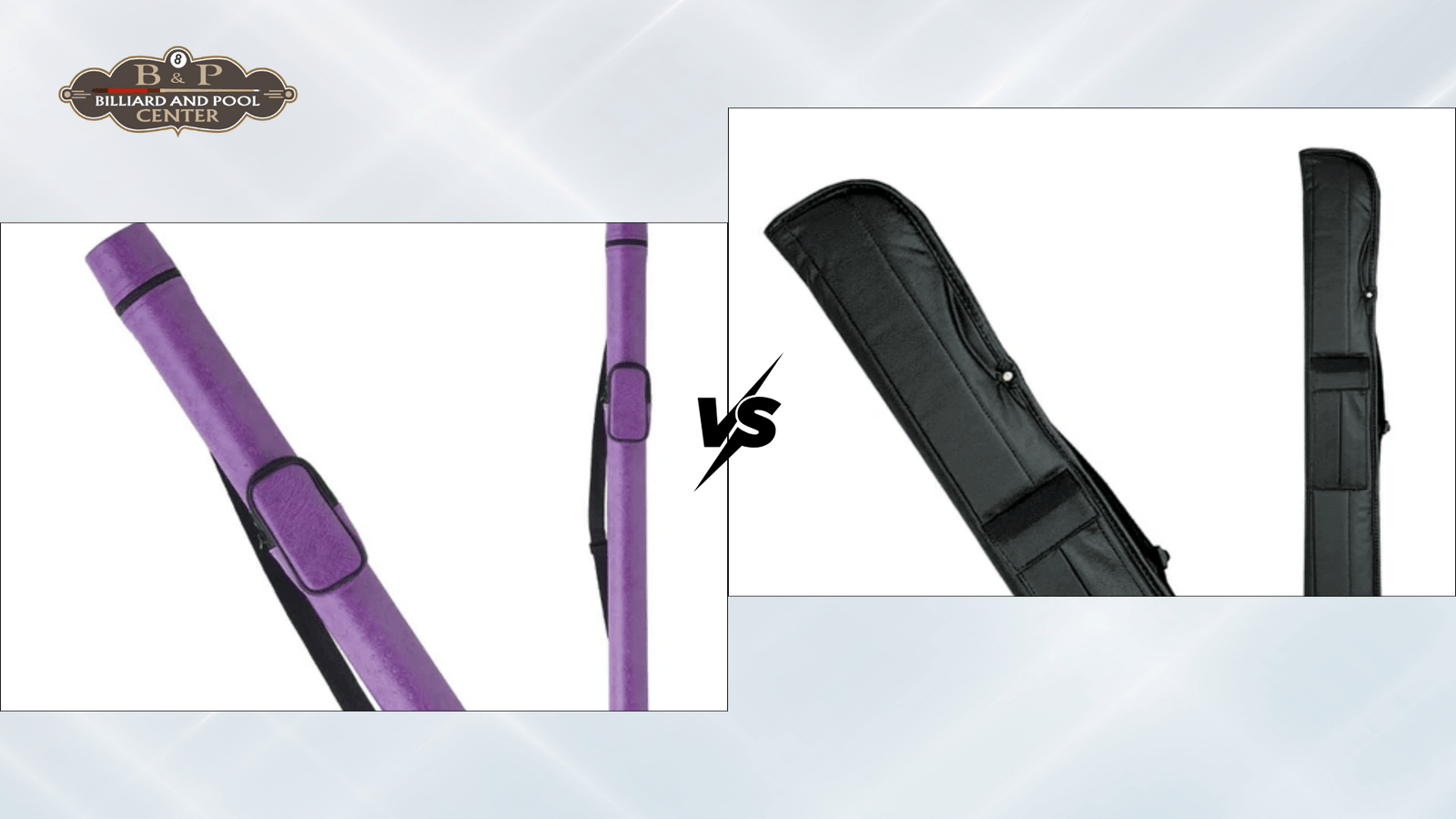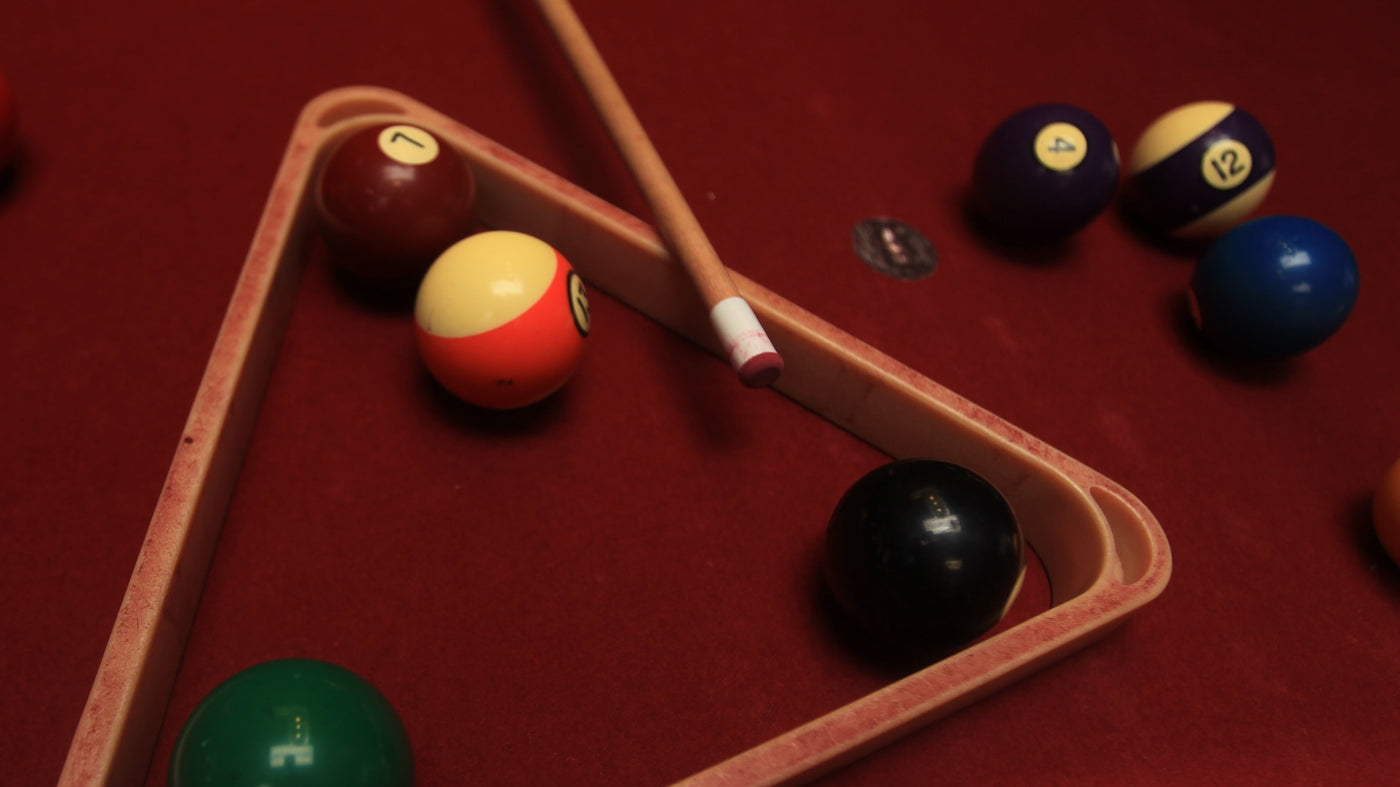Selecting the ideal pool cue case is all about protecting your equipment, reflecting your personal style, and empowering every moment at the table.
For players at all levels, the right case is a long-term investment.
This comprehensive guide will reveal how hard and soft pool cue cases compare, which features make the real difference, and how to choose based on your needs and playing style.
Why is Pool Cue Protection Important?
A quality cue is the foundation of every great shot. But even the finest cue can crack, or lose its edge if not transported and stored properly. Pool cue cases aren’t simply accessories, they safeguard your cue’s condition, performance, and lifespan.
Top players, collectors, and regular league members trust their cue cases to preserve their most valuable equipment. That means making the right choice now saves costly repairs and inconsistent shots later.
Hard vs. Soft Pool Cue Cases
The debate between hard and soft cases has long divided pool enthusiasts. Each style brings distinct advantages to the table.
|
Feature |
Hard Cue Cases |
Soft Pool Cue Cases |
|
Protection |
Superior—rigid, impact-resistant, shock-absorbent |
Basic—resists scratches, but less impact/warp protection |
|
Portability |
Bulkier, heavier, less flexible |
Lightweight, flexible, easy to carry |
|
Durability |
Highly durable, less prone to external wear |
Lower—prone to wear, can get crushed under heavy objects |
|
Capacity |
Available in multiple sizes (e.g., 4x8 pool cue case, 2x2 cue case) |
Available in various sizes (e.g., tube, butterfly, backpack style) |
|
Cost |
Higher—premium materials like leather, reinforced tubes, multi-pocket designs |
More affordable, simpler construction |
|
Accessory Storage |
More pockets, better organization |
Limited, often smaller pockets |
Key Takeaway

• Hard cue cases are perfect for frequent travelers, professionals, or those with premium equipment.
• Soft cue cases suit casual players who play locally or want something lightweight and budget-friendly.
Essential Features To Look For
1. Protection Quality:
• For those with custom pool sticks or high-value cues, hard-sided options such as elite cue cases or instroke cue cases add invaluable safety.
• Soft bags offer decent defense against scratches, good for entry-level cues or backup sticks.
2. Materials & Construction:
• Modern hard cases include options in ABS plastic, aluminum, or reinforced resin.
• Soft cases may be constructed from nylon, canvas, or vinyl for increased portability.
3. Size & Capacity:
• Think about your kit. If you own multiple cues or shafts, a cue case 2x4, cue case 3x5, or even 4x8 cue cases can hold your essentials, break cues, and jump cues.
4. Interior Padding & Dividers:
• Look for plush felt or foam linings and individual cue holders for maximum shaft and butt protection.
5. Portability & Comfort:
• Consider adjustable shoulder straps, reinforced handles, and balanced weight distribution.
6. Accessory Storage:
• Pockets are crucial for chalk, tip shapers, joint protectors, and gloves—especially in professional games like 9-ball tournaments.
When To Choose a Hard Pool Cue Case?

• You travel regularly or compete in tournaments.
• Your cue is a sizable investment (e.g., for a mcdermott cue).
• Humidity and temperature swings are frequent, risking cue warping.
• You want to avoid accidental dings/damage during flights, commutes, or crowded venues.
Hard cases are especially popular for storing multiple high-end cues, carbon fiber shafts, and other accessories that demand maximum defense.
When a Soft Pool Cue Case Is Best
• You’re a casual or beginner player.
• Space and weight matter most for easy carrying.
• You rarely transport your cue far (e.g., home to local club only).
• Cost-effectiveness and light weight take priority over premium-level defense.
Soft cases shine for convenience and comfort, though for very valuable cues, they may not deliver enough protection against major impacts.
Comparing Popular Pool Cue Case Brands
With growing demand, reputable brands now offer every case style imaginable. Here are top case lines trusted by players worldwide:
• Outlaw cue cases: Rugged exterior with striking designs appealing to those seeking personality.
• Instroke cue cases: Leather-bound classics with interior tubed compartments for advanced protection.
• McDermott cue cases: Blending traditional looks and advanced structure—excellent for collectors.
Capacity Guide: What Do The Numbers Mean?
Case size codes like 2x4 cue case or 4x8 pool cue case refer to maximum interior capacity:
• 2x2 = 2 butts, 2 shafts
• 2x4 = 2 butts, 4 shafts
• 3x5 = 3 butts, 5 shafts
• 4x8 = 4 butts, 8 shafts
Selecting the right size ensures enough room for break cues, spare shafts, jump butts, joint protectors, and essential accessories.
How To Choose Between Hard and Soft Cue Cases?
1. Match your choice with your pool routine:
• Local players benefit from flexible, portable soft cases.
• Competitive travelers and tourney players need the resilience, security, and storage that only hard cases deliver.
2. Consider your environment and frequency:
• For club or league play, even affordable soft or billiard cue cases are sufficient.
• On-the-go players or those with frequent location changes should seek out robust, hard-sided options.
3. Factor in your cue’s value:
• Invest in a hard or premium case for high-end cues or carbon fiber models.
• For introductory cues, standard soft designs offer a practical and budget-smart choice.
Best Pool Cue Case: What Top Picks Offer

When browsing pool cue cases, review customer ratings for:
• Zipper or latch durability
• Handle/strap comfort
• Real-life protection in demanding situations
• Accessory and pocket layout
Comparing Hard and Soft Cases: Quick Table
|
Factor |
Hard Cue Case |
Soft Cue Case |
|
Weight |
Heavier |
Lightweight |
|
Impact Defense |
Top-tier |
Limited |
|
Flexibility |
Rigid |
Flexible |
|
Storage |
Large accessory capacity |
Minimal accessory space |
|
Portability |
Less portable |
Ultra-portable |
|
Price |
Higher investment |
More affordable |
When considering a case, always match the choice to your personal cue selection experience. If you haven’t finalized your cue, explore our comprehensive guide on selecting the right cue for your skill level. And if you plan to compete seriously, review important game rules before heading to your next event.
Frequently Asked Questions (FAQ)
Q: Which is better: hard or soft pool cue case?
A: Hard cases provide maximum defense against drops, warping, and impacts, ideal for travel and expensive cues; soft cases are lightweight, portable, and cost-effective for local use.
Q: How do I select the right case size?
A: Assess your current and future gear. Count cue butts and shafts, then choose the case labeled with that capacity (e.g., 4x8 pool cue case holds 4 butts + 8 shafts).
Q: Are leather pool cue cases worth the cost?
A: Leather delivers style and lasting impact resistance, making it a top choice for serious players and luxury cues.
Q: How can I keep my case (and cue) in the best shape?
A: Wipe down interiors and exteriors regularly, ensure zippers/pockets are secure, and avoid exposing cases to the heat or direct sunlight for extended periods.
Q: Do soft cue cases offer enough protection?
A: For casual play and low-value cues, soft cases are usually sufficient. For high-end or custom pool cue cases, opt for maximum protection.
Final Thoughts: Making The Smart Choice
Every game is easier when you know your cue is safe, organized, and ready for action. The perfect cue case is the one that mirrors your play style, safeguards your investment, and fits effortlessly into your daily routine.
To browse the latest hard and soft models including all styles, colors, and sizes. Check out Billiard & Pool Center’s high quality cue case collection.
With the right case, every journey to the pool hall is one step closer to your next win.
Protected and Prepared, every single time.


